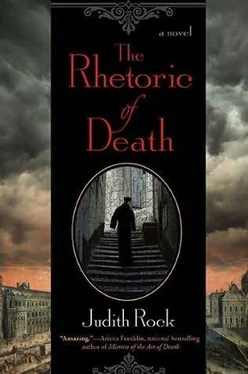Judith Rock - The Rhetoric of Death
Здесь есть возможность читать онлайн «Judith Rock - The Rhetoric of Death» весь текст электронной книги совершенно бесплатно (целиком полную версию без сокращений). В некоторых случаях можно слушать аудио, скачать через торрент в формате fb2 и присутствует краткое содержание. Жанр: Исторический детектив, на английском языке. Описание произведения, (предисловие) а так же отзывы посетителей доступны на портале библиотеки ЛибКат.
- Название:The Rhetoric of Death
- Автор:
- Жанр:
- Год:неизвестен
- ISBN:нет данных
- Рейтинг книги:3 / 5. Голосов: 1
-
Избранное:Добавить в избранное
- Отзывы:
-
Ваша оценка:
- 60
- 1
- 2
- 3
- 4
- 5
The Rhetoric of Death: краткое содержание, описание и аннотация
Предлагаем к чтению аннотацию, описание, краткое содержание или предисловие (зависит от того, что написал сам автор книги «The Rhetoric of Death»). Если вы не нашли необходимую информацию о книге — напишите в комментариях, мы постараемся отыскать её.
The Rhetoric of Death — читать онлайн бесплатно полную книгу (весь текст) целиком
Ниже представлен текст книги, разбитый по страницам. Система сохранения места последней прочитанной страницы, позволяет с удобством читать онлайн бесплатно книгу «The Rhetoric of Death», без необходимости каждый раз заново искать на чём Вы остановились. Поставьте закладку, и сможете в любой момент перейти на страницу, на которой закончили чтение.
Интервал:
Закладка:
When they dismissed both casts at the end of the afternoon, the third act of Clovis was a little smoother and Beauchamps had coerced miracles of order and memory from the dancers, even the musically dense Beauclaire. Charles was exhausted. The night before, he had ignored the bell for going to bed and stayed up until his candle burned itself out, rereading Clovis and planning how he would direct the actors. Then he’d lain awake wondering how Antoine had gotten the cut on his forehead. And how to reconcile the discrepancies between Mme LeClerc’s report of the accident and Guise’s. It seemed that he had hardly closed his eyes before the waking bell announced a new and unwelcome day.
Now, with the Compline bells about to ring, all Charles wanted was bed and the oblivion of sleep. Instead, still dogged by his questions, he went to the infirmary to see if Antoine had remembered anything of the accident. As he climbed the infirmary stairs, high-pitched wailing met him. At first he thought that Antoine was crying, but then the wailing turned to words.
“Oh, Blessed Virgin, this child is dying! Fernand, can’t you see? Oh, dear Jesu and all the saints-”
“Softly, Lisette, hush! He is not dying, he is doing very well, you heard Frere Brunet! Do not distress yourself-Lisette!”The faint sound of scuffling came through the door. “What is that thing? Give it to me!”
There was a female shriek and a male oath.
“God’s teeth, madame, what do you want the good fathers to think-”
“It is only my charm, my maid gave it to me, she cares that I am suffering! If our baby dies, it will be your fault, give it back! Oh, why have men no feelings? St. Anne, help me!”
Charles turned quickly back, remembering what he’d heard about Mme Doute. At least he now knew that Antoine’s father and stepmother had arrived and that the little boy was better. His other questions could wait. He had started downstairs, thinking with relief that Jouvancy must also have returned, when the door opened and a brief glow of candlelight brightened the antechamber outside the infirmary. Charles looked over his shoulder to see a stout, harassed-looking man hesitating at the top of the stairs.
“A word, mon pere,” the man said curtly.
Charles retraced his steps. “I am Maitre du Luc, monsieur. How may I help you?”
“I am Monsieur Fernand Doute.” The wall sconce candle cast flickering shadows on the man’s pale, sagging face. “I want to speak with whoever saw my boy Philippe last.”
“He has not returned home, then?”
“Not when I left. And I do not believe for a moment that he simply ran away! That is a tale told by some enemy to get him into trouble!”
“Pere Jouvancy told you what happened?”
“Yes, yes, he told me, but-I simply cannot believe it. He said that some new teacher went after the boy. And who knows what happened? I want to see that man!”
Charles didn’t react. “Has Pere Jouvancy returned with you to Paris, monsieur?”
“Yes, but he insisted on continuing in my carriage to the college’s country house at Gentilly.”
“Gentilly?” Charles said, and then remembered that Louis le Grand had a house in a small village a day’s walk south of Paris.
“He had some idea that Philippe might go there,” M. Doute was saying, “since the boy has spent school holidays there. I doubt that’s where he is, but Joseph-Pere Jouvancy, I mean, he is my first wife’s brother-wanted to leave nothing undone.” Doute started to rake his pudgy hands through his hair, knocked his wig askew, and yanked it straight. He clasped his hands tightly at his full-skirted coat’s straining closure. His awkward anguish suddenly reminded Charles of his own father seeing him off to war the first time.
“It was I who was sent to find Philippe, Monsieur Doute,” Charles said gently. “This is only my third day at Louis le Grand. I am the new assistant in the senior rhetoric class. Philippe went over the college’s rear wall and I followed him, but I lost him in the rue St. Jacques.”
M. Doute’s little eyes narrowed, and he released his clasped hands and took a step toward Charles. “And what did you do to him that he would run?”
“Not the smallest thing, monsieur, I assure you. As I said, I had only just met him.”
“Yes, yes, you did say that. Forgive me.” Doute lifted his hands helplessly and let them drop, his limp lace cuffs fluttering like tired birds. “It is only that-I cannot understand any of this! And Antoine-what was he doing out by himself? No one can even tell me that! Do you let these children run wild?”
“We have learned that Antoine’s teacher gave him permission to go to the latrine, monsieur. The child must have slipped out by the stable gate. It’s near his classroom. The brother at the street postern swears he never left his post, and never saw the child.” Charles spread his hands apologetically. “The college is not a fortress, monsieur. Is Antoine better this evening?”
The father’s eyes softened. “Yes. They say he will recover well.”
“Thanks be to God.”
Doute nodded distractedly. “But Philippe-I have called on everyone he might go to here in Paris, but no one has seen him. My God, when I sent the boys back here on Sunday-no, I am going distracted, it was a week ago Sunday-I never thought-” He pressed his lips together and shook his head.
“Sent them back after your wife’s birthday fete, you mean?” Charles said, remembering that Jacques had mentioned the fete when he came to see Antoine in the infirmary.
“Yes. They don’t come home often, but the thirteenth was their stepmother’s first birthday since we married, and we celebrated with a small family fete. I particularly wanted them there. So they will know her better.”
“I see. Did Philippe seem-worried about anything while he was there?” Charles said carefully. “I only ask because Pere Jouvancy mentioned that lately the boy has seemed-distracted.”
“Yes, Pere Jouvancy told me that. But I can’t say I’ve noticed much. Only that on the evening of the fete he was somewhat sullen, and refused Mme Doute her birthday kiss. And he was rude to Pere Guise. Count yourself fortunate that you will never know the shame discourteous sons bring on their father! In the end I had to box Philippe’s ears to remind him of his manners.” M. Doute tried to smile. “Well, we all know what youth is. And Pere Guise can be very-definite, shall we say, in his opinions. Young men are not always patient with that. But he has long been a dear family friend, and is godfather to Antoine. He was Adeline’s-my first wife’s-confessor, and Philippe and Antoine have known him all their lives. Pere Guise is nearly as distraught as I am over this accident.” Doute sighed. “Indeed, I should speak with him. Can you bring me to him?”
Trying to imagine the dour Guise as anyone’s dear family friend, Charles led the way outside and through the infirmary garden’s deep summer green, fading to black now in the twilight. They entered the main building by its back door and went to the grand salon, where Charles rang a bell on a side table. Slow steps padded across the antechamber and an elderly lay brother stuck his head around the doorway.
“Oui?” he rasped, his bald head shining in the light from a copper sconce.
“Mon frere, will you please ask Pere Guise to come down? M. Doute would like to speak with him.”
The brother grunted, dodged a drip of wax from the sconce, and trudged upstairs. Wanting a glimpse of Guise’s relationship with this family, Charles tried to keep up a conversation with Doute, but it was hard going.
“Fernand?”
They both jumped slightly and turned. Guise had arrived behind them as soundlessly as a wraith. He stretched out his hands to Doute.
Читать дальшеИнтервал:
Закладка:
Похожие книги на «The Rhetoric of Death»
Представляем Вашему вниманию похожие книги на «The Rhetoric of Death» списком для выбора. Мы отобрали схожую по названию и смыслу литературу в надежде предоставить читателям больше вариантов отыскать новые, интересные, ещё непрочитанные произведения.
Обсуждение, отзывы о книге «The Rhetoric of Death» и просто собственные мнения читателей. Оставьте ваши комментарии, напишите, что Вы думаете о произведении, его смысле или главных героях. Укажите что конкретно понравилось, а что нет, и почему Вы так считаете.












